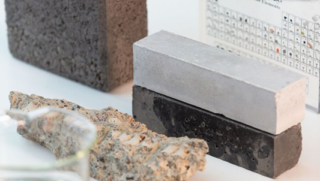-
Finland’s Betolar develops green cement as construction races to decarbonise
Date posted:
-
-
-
Post Author
Greg Kelsall
-
-
![]()
Finland’s Betolar is pioneering the production of low-carbon cement by using alternative industrial waste products in a process that could reduce carbon dioxide emissions by up to 80%. The materials technology company has launched Geoprime, an alkali-activated material that can be mixed with waste from a variety of industries to replace cement in the production of concrete. Conventional cement making involves exposing carbonate materials, usually limestone (CaCO3), to intense heat in a rotating kiln. High temperatures drive ‘calcination’, creating calcium carbonate (CaO) and carbon dioxide (CO2). Extra CO2 is produced also, through the combustion of fuels, usually coal or natural gas, to provide the 1600°C heat needed to drive the reaction. Around 60% of the CO2 emission is inherent to the process of producing the cement clinker, with little alternative to reduce CO2 emissions other than through carbon capture and storage.
Examples of industrial waste materials that could be used in the production of low-carbon cement include steel slag, fly ash from power plants or mine tailings, which could be reacted with CO2 to form carbonate materials that are suitable ingredients for concrete. These materials still offer similar levels of performance and meets EU standards, whilst achieving an 80% smaller carbon footprint. Betolar’s intellectual property (IP) licensing model also allows this new solution to be easily scaled-up, as it uses existing concrete production facilities.
The concrete sector – and construction in general – is looking for ways to reduce its CO2 emissions and to increase recycling, especially as one of the EU’s Green Deal’s main targets is to expand the ‘circular economy’ and to find new uses for industrial by-products. The construction industry is currently responsible for 38% of carbon emissions, according to a recent report called ‘Net Zero Buildings: Where do we stand?’ from the World Business Council for Sustainable Development.
“We are ready to help concrete manufacturers be more competitive by getting ahead of the demand for sustainable, circular economy materials to satisfy growing customer, infrastructure and real estate investor demand,” said Betolar CEO Matti Löppönen.
What this means is that the world’s concrete manufacturers can license the use of Geoprime from Betolar to offer sustainable concrete that can compete in the world marketplace, but with 80% lower emissions. As well as helping to find a use for many more industrial by-products that would otherwise go to landfill, Betolar’s smart solutions work within existing production facilities to speed-up production without any significant capital outlay, which means a faster time-to-market. Betolar’s business model involves licensing its IP, which will mean that concrete manufacturers can utilise their existing production facilities to make concrete without requiring any additional capital outlays. By using local industrial wastes which would otherwise be sent to landfill, Betolar’s new solution will also reduce concrete’s environmental impact, as there will be lower transportation costs.

